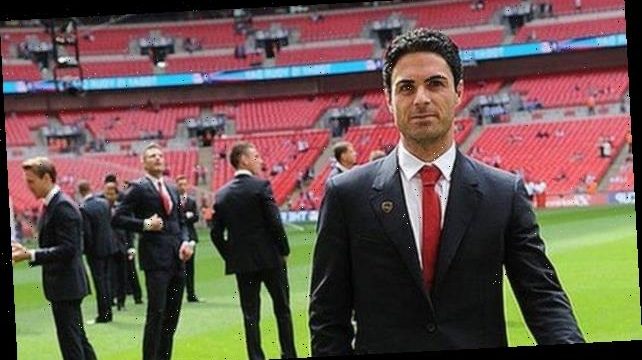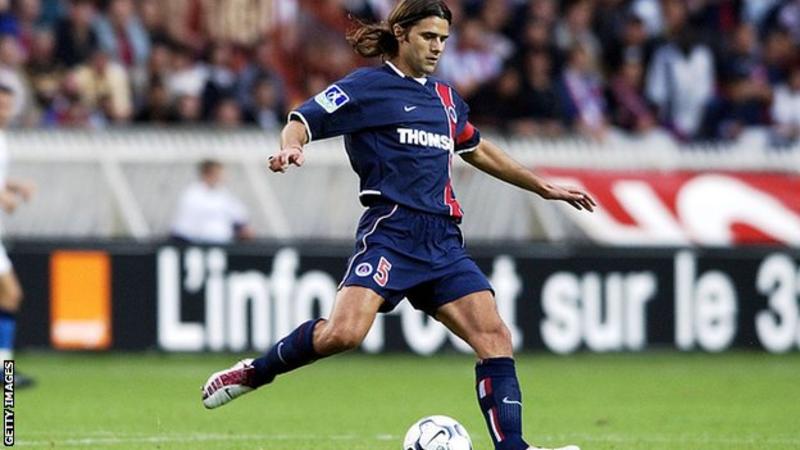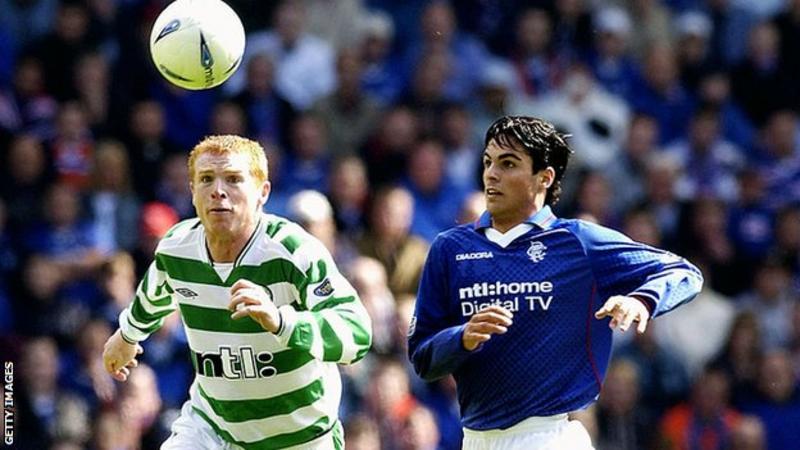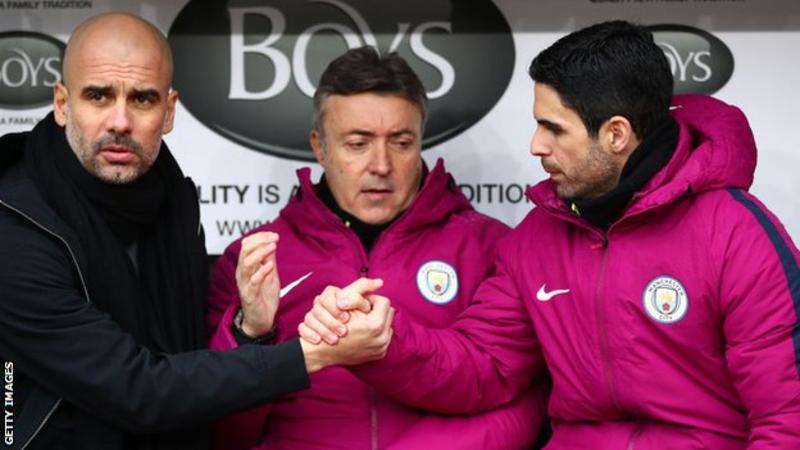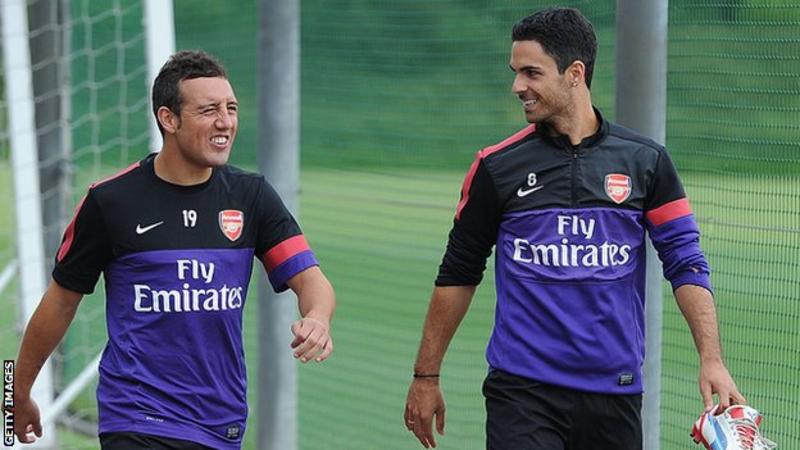Guillem Balague will be writing a regular column throughout the season and also appearing every Thursday on BBC Radio 5 Live’s Football Daily podcast, when the focus will be on European football.
You can download the latest Football Daily podcast here.
Mikel Arteta has been appointed Arsenal’s new manager and, while he may appear something of a novice to many, those who know him well say it is a moment he started preparing for more than 20 years ago.
Even in his early playing days at Barcelona’s academy, in 1997, he was showing the kind of leadership skills which made him a distinctive figure. He has left his mark everywhere he has been since then, not merely as a player but also as a major influence on the team, both on and off the pitch.
Such is the regard in which he is held at Manchester City, there has long been an understanding that it was only ever going to be a matter of time before their assistant manager found himself being offered the top job at another major club. He has rejected the possibility of leading Newcastle and Lyon in recent months as they did not feel right at the time.
In a recent interview City manager Pep Guardiola said: “Everyone has dreams and desires. Hopefully he’s going to stay this season and the next for as long as possible at this club. That would be my dream.”
In fact Guardiola, who knows that most managers cannot choose when and where to move, told Arteta that if an offer of this stature arrived, he would kick him out of the club himself. When it did, Arteta could not refuse – and he kept Guardiola informed of Arsenal’s interest as he had done when other clubs approached him.
In that same interview, Guardiola added that “with his knowledge about the game and his work ethic, he’s ready, absolutely”, adding that it was not beyond the realms of possibility that Arteta might be his successor as City boss.
Guardiola will inevitably be a major influence on Arteta. As will another of the leading Premier League managers of recent years: Mauricio Pochettino.
When Arteta moved to Paris St-Germain on loan in 2001, he found there a kindred spirit in the Argentine, who was one of the first players he tried to emulate.
Pochettino, sacked by Tottenham in November, helped teach Arteta about what was right and wrong when it came to dressing room behaviour, how to interact with players, how to win the respect of team-mates and, crucially, how to become a leader.
In Arteta’s first game for PSG it became clear to Pochettino that this was a player prepared to assume responsibility when the 17-year-old asserted his authority by taking charge of free-kicks and other set-pieces.
“He was brilliant not only because of his talent but his maturity on the pitch,” the former Tottenham manager told Sky Sports in February. “His knowledge about football surprised me. He was a young player who had a capacity to talk at the same level as a 30-year-old player.
“For me, he’s going to be one of the best coaches when he decides to be a coach. He has the capacity to be one of the greatest, for sure. He’s a top personality and character.”
After PSG, Arteta moved to Scotland to join Rangers and, again, his enthusiasm for assuming responsibility became abundantly clear.
He was just 19 years and 48 days old when his 94th-minute penalty earned Rangers the 2002-03 league title thanks to a goal difference advantage of just one over Celtic. In the event, because Rangers had scored more goals they would have won the title even if Arteta had missed his spot-kick, but nonetheless the pressure on even the most experienced and mature of players would have been almost unbearable.
At Everton, a club where he spent six years between 2005 and 2011, he fought for more creative players to be brought in and helped to build a totally different style and playing ethos than the one that existed when he first joined. The Toffees’ manager at the time, David Moyes, quickly realised Arteta could improve the team on the pitch but also help develop the philosophy the Scot wanted to impose.
It was at Arsenal, though, that he had his greatest influence. When he joined the club it was a quiet, split, disparate group where an easy-going Arsene Wenger had created a world of non-confrontational complacency.
He encountered a monastically quiet dressing room where no-one was willing to speak out or say anything controversial. A place where no-one was prepared to stick their head above the parapet, even when necessary to ensure problems could be addressed and solved.
But it wouldn’t be long before he began to try to get his points across to his team-mates. Ten days after signing he made his debut and found himself faced with a silent dressing room after a sterile 0-0 first-half performance against Swansea.
Unable to contain himself, he said his piece before turning to his left, where he noticed manager Arsene Wenger taking it all in but saying nothing. The Frenchman – and the players who witnessed the moment – knew then that he had brought a genuine leader into the club.
One issue Arteta addressed at Arsenal was the lack of a bonus system, either for the players or anyone else in the organisation. He could see there were no incentives to do anything other than the minimum. He pushed for that system to be put in place.
Along with players like Per Mertesacker (now head of the academy) and Freddie Ljungberg (who has been in interim charge since Unai Emery’s sacking), Arteta helped change the dynamic of the Arsenal dressing room, not because they wanted to start trouble but because it had to be done if things were to get better.
He knew if he was prepared to go into battle wherever he felt it would benefit the club, others would join him because they would realise it was being done for the right motives.
And the more players joined, the more a family atmosphere was created. Barriers were broken down. According to a club source, it was at Arteta’s suggestion that a room was built for players’ families, who would gather there for three hours or more at the end of a game.
- Arsenal appoint Arteta as manager
- ‘This is a good decision’ – Emery backs Arteta as Gunners successor
Reinventing players – the move into coaching
The 37-year-old’s first official coaching role came at City, courtesy of Guardiola. It was not a surprise move – the pair had enjoyed long conversations before Guardiola committed to moving to England in 2016.
Arteta was not initially given any specific responsibility but Guardiola never lost sight of the fact he was the City coach who knew the Premier League better than anyone else.
Effectively he was recruited to bring in young blood, new energy, different ideas, and to help with communication. Initially he listened, took on board the club’s methods and culture, then he looked at what needed to be changed without upsetting the applecart and sought to impose smooth adjustments to the routine.
Gradually he found his feet, suggesting improvements, and steadily his influence within the club grew.
One of his major roles has been to bring out the best in players by looking to highlight what is missing from their games. He has been important in the development of Raheem Sterling and Leroy Sane, as both have admitted, through video analysis and long chats in the office, as well as making corrections in training.
Highlighting weaknesses in the game of any top-flight player can be a sensitive issue. But it is also an essential one.
Fabian Delph and Oleksandr Zinchenko had to make the transition to full-backs and Fernandinho has had to reinvent himself as a central defender. All three have benefited from Arteta’s forensic expertise.
Brazil striker Gabriel Jesus has had his fair share of problems integrating into the City way but he, too, has been helped by Arteta’s guidance.
In a recent interview he said: “He’s helped a lot of players. When I want to do finishing after training, I tell him and he comes and helps me. He is really fantastic for us. All the players know that – everyone knows that in the club. He is a fantastic guy and fantastic manager.”
Bit by bit he gained the trust of the players until Guardiola eventually told him – before a league match against Arsenal – “I only ever hear you in training. You give the team talk today. You know Arsenal better than me – explain to them what they need to do and how.”
Arteta had well and truly arrived.
Principled and strong-minded – a first step to success?
That knowledge of Arsenal is undoubtedly one of the factors which attracted the club’s board to appoint him and he will need every bit of experience gained from his time with Guardiola because, in a nutshell, so much of the team needs changing.
It will help Arteta that he is strong-minded, a man with a set of principles that are non-negotiable.
One player who knows him better than most is his former team-mate at Arsenal, Santi Cazorla, who was helped and mentored by Arteta when he joined Arsenal from Malaga.
I spoke to Cazorla last week and he had no doubts his great friend would be more than capable of taking any top-flight managerial job and making a success of it.
“He has the personality to do so and those who think otherwise are very much mistaken,” he said. “He is not the sort of person who will shy away from making the most difficult and drastic decisions he might have to.”
Could Cazorla, a former Arsenal captain, be brought in to supplement a staff already comprising Mertesacker and Ljungberg?
“In the future, who knows?” said Cazorla, who is enjoying playing for Villarreal after a two-year injury nightmare that almost left him unable to walk.
“I will certainly have to work out what I want to be doing and it is right to say that we have a great relationship and many times we have talked about what the future will bring us.
“I will always be open to helping him because he is my friend and also because of all the things he did for me when I came to England.”
Ultimately, of course, Arteta will be judged on results, just as Emery was before him. Arsenal believe they have the right man to restore them to their former glories and those close to Arteta believe he has all the skills to do just that.
One thing is clear: it will take not just a strong will but time too, and the club is willing to give it to him.
Source: Read Full Article
